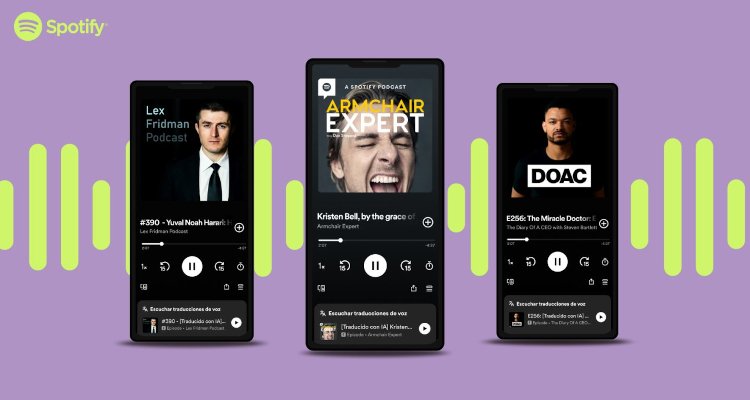
Some of the podcasts with AI translation support on Spotify. Photo Credit: Spotify
Spotify is officially using artificial intelligence to generate Spanish, French, and German voice translations of multiple podcasts.
The Stockholm-headquartered business formally detailed its AI-translation pilot today, only days after reports suggested that a series of new artificial intelligence functions would arrive within the rumored “Supremium” tier. Of course, Spotify, like so many other tech companies, has long been investing in AI, which powers the seemingly popular “Daylist” playlist that it rolled out earlier in September.
Now, the owner of AI-voice platform Sonantic has debuted a podcast-translation feature that also manages “to match the original speaker’s style” and voice, according to higher-ups. The “Spotify-developed tool” has already made available to paid and ad-supported users Spanish-language versions of “select” prior projects from individuals such as Dax Shepard and Monica Padman, Lex Fridman, The Ringer founder Bill Simmons, and Steven Bartlett.
The listed podcasters’ forthcoming episodes will be translated as well, per Spotify, which is preparing to bring the AI offering to different programs including Trevor Noah’s upcoming show. Meanwhile, beyond the already-released Spanish translations, fans will have access to German and French editions of the involved content “in the coming days and weeks,” communicated Spotify, which is further harnessing AI to make adverts with depictions of podcast hosts’ voices.
Needless to say, this latest announcement represents the tip of the AI iceberg at Spotify, which acknowledged that “creator and audience feedback from the pilot will provide important insights for future expansion, iterations, and innovations.”
More broadly, the service has for some time been working to diversify beyond music and its razor-thin margins, and it’s possible that AI could enhance and accelerate related initiatives. Audiobooks, for instance, are reportedly poised to play a major role in the aforementioned Supremium tier and (in the form of a new monthly benefit) for existing premium accounts.
Building upon the point, Spotify over the weekend posted a job listing for a data-scientist position that will center on “new content formats,” specifically driving “insights and learning around our growing number of content formats beyond music and podcasts (audiobooks, ambient, video),” according to the relevant description.
Spotify (the co-founder and CEO of which invested in an AI-geared venture firm a couple weeks ago) is far from alone in embracing artificial intelligence’s industry presence, with others capitalizing on the technology in terms of paid fan interactions, music generation, live radio programming, tagging/classification, and marketing.
Particularly on the creative side, the media with which AI systems “train” continues to be a significant focus area; authors last week sued ChatGPT developer OpenAI for allegedly utilizing their protected works without authorization.
Additionally, ASCAP songwriters visited Capitol Hill to urge legislative action on artificial intelligence, discussing topics including the need for AI developers to credit, compensate, and obtain permission from rightsholders and creators for the use of music.

